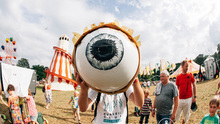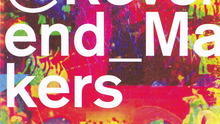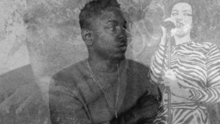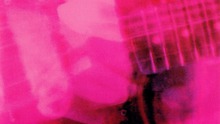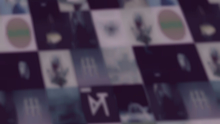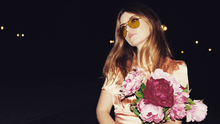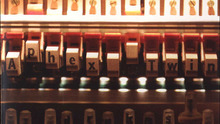Fresh off an extensive US tour with one of her foremost patrons, Elvis Costello, and with her own upcoming British tour scheduled to follow hot on the heels of the October release of her second, critically acclaimed album 'When the Roses Bloom Again', I met up with her in a ranch-bar internet corner on Sunday, November 17.
After exchanging polite introductions, this is what she had to say about all things country, alt-country and distinctly un-country over my canister of whisky...
The recent American Country Music Awards show. What did you think?
Well, unfortunately, I completely missed the CMA awards. We were playing a show with Elvis Costello in Atlanta that night and I had some family there in Atlanta and I just couldn't make it to the TV to see the show. Understand that I haven't missed that show in more than ten years. I usually am glued to the TV to see what I like, what I don't, and what everyone else is wearing! I was disappointed to miss the show, but I think they're going to rerun it during Thanksgiving weekend so I might get another shot. The only thing I saw was a snippet of a Shania Twain interview backstage. She didn't look that happy, but I have no idea what the context was at all.
Well, Shania Twain, from what I recall, was wearing a leopard and she didn't look too happy because it was biting her. Certainly the outfits are taking a bigger and bigger precedence over the artists themselves.
Well, the show itself has definitely tried to become more glamorous, with all the stars wearing their designer clothes, especially the ladies. I remember watching in the late 80s with my roommates in New York and there was this band, the Kentucky Headhunters, and they basically looked like an even more hirsute version of Lynyrd Skynyrd, and my roommates just hooting at how 'country' they looked. Unfortunately, you get a lot better groomed stars now and it isn't that interesting!
On a similar note, how do you feel about country music - maybe more so than any other genre - being invariably presented to the mainstream in its most banal, watered-down form (the era of "Cookie Cutter Country," as Johnny Cash recently said) as it has been in recent times. Although the Country “underground” will always thrive, have the long string of novelty cowboys blocked the route to the mainstream surface?
Well, as a true country music fan of the old stuff up to the present, it does grate a bit to hear the distinction being made between "young country" and the music previously defined as country music. I heard a radio slogan on our trip "W-blah blah blah, not your father's country..." and then music following that announcement basically sounds like 80s pop with a fiddle or guitar thrown in. But there is a lot of current, commercial country now that I really like, like the Dixie Chicks, I loved that single "Old Red," I am forgetting the artist's name, there is still a lot of good stuff on country radio. And then there is a growing appreciation of the music that is not on country radio, let's call it the "O Brother" stuff, bluegrass, acoustic music, I think there is a healthy amount of that recognised by the media right now.
I think the saddest thing for me in terms of the changes in country music over the last thirty years is the loss of distinction between different artists sounds. It used to be that you could tell the difference between a Loretta Lynn record and a Tammy Wynette record from the first few notes, before either woman started singing. The great instrumentalists, guitar players and steel players, fiddles, etc, all had their own styles and intended to sound different. I think that excitement about playing unique music is gone and a lot of records coming out of the country music establishment sound totally generic except for the singing. There seems to be one guitar sound on every mainstream country record I hear and to me it sounds like the guy who played in Journey all those years ago. Now that is sad when you realize how many exceptionally talented people there are who play in Nashville, and they've basically boiled it down to one acceptable "commercial" sound.
Funnily enough, I was watching the film La Bamba last night - Richie Valenzuala becoming Ritchie “with a T” Valens etc. Homogeneity is a widespread phenomenon. Maybe one of the most striking characteristics of this is the fact that ambition art-wise and integrity for most people in the grasp of the mainstream seems to be a totally foreign concept, swamped by a commercial conformity, of which fame is seen as the ultimate prize.
Well, fame is a seductive thing. And there are a lot of people, I am thinking now of all those young "American Idol" folks, who are talented and have big dreams and no clue how to achieve them. And unfortunately there isn't a great roadmap to success that makes it plain and easy to achieve. So I think some get confused that fame is the thing. I've had a joke with my guitar player for years, he coined this term: tiny fame. It was the state of being in New York, where if you had a band that got popular locally, you might get recognised south of 14th street, but certainly not above!
Artists like the filmmaker Jean-Luc Godard have been vociferous on their desires to take their particular art back to its roots and “original vocation”. In the way your music is steeped in its roots you seem to have a lot in common with this aesthetic. Do you have a similar outlook regarding music?
Well, because I am a sort of amateur historian of country music, I have tried to acquaint myself with all the "roots," and how they've evolved. The Carter Family were so plaintive and direct, you don't think of them as flashy performers, but in their same era, a guy like Uncle Dave Macon was all about performance and "show." And then there were people like Hank Williams who had equal measures of emotional content and show-business instincts. And we still have Dolly Parton around who certainly works both sides of that fence.
In my own music, I think my approach is somewhat dictated by the type of voice that I have. Since I am not a real "big" singer, I try for some of the impact that you can achieve through restraint. And I am a big fan of songs, so I try to let them do most of the work!
I think that, in particular, it's the sheer authenticity you manage to portray in your music that makes you a much more appealing proposition than most of your “alt-country” peers who could be said to be more progressively-minded. Do you recognise and acknowledge this greater appeal you have than your average artist, and what would you yourself put this down to?
Well, I do think I have some kind of talent to communicate. I don't know exactly what it is actually, but I first discovered it on the radio, that people seemed to like the songs that I chose to play and how I presented them. It isn't that much different now that I am now performing, that I try to find songs that I respond to and present them from my point of view as an artist. I think that's the best I can analyze it!
On a more mundane level, how do you manage vacillating between the music (touring, recording and radio) and holding down a daily job at a bank?
Well, I know that it is definitely an odd combination of hats for one person to wear. It makes more sense if you realize that WFMU, where I have worked for over ten years, is a volunteer organisation and no on air staff there get paid. When I started at WFMU, I sort of looked around and tried to observe how everyone there made a living while pursuing their avocation. And everybody had some kind of regular job, proof readers, administrative assistants, some doing tech work at commercial radio stations, so it made sense to me to just go find a job that I could do nine to five that wouldn't interfere too much with what I wanted to do with my own time. Having stayed in New York for so long, it also becomes apparent that it is a very expensive place to live, and you just have to make it work out. So as I've performed and recorded my own music, that basic template of needing something to subsidize my musical habits hasn't changed. So be it.
How would the country music scene there (in New York) differ to the one in Nashville?
There is a great music audience in New York, for all kinds of music. It is an audience that likes to go out, drink, hang out. You can get your own local audience here, to come see your live show. In Nashville, which is a city of about one million, it is a lot harder to cultivate a live audience. There is a great, knowledgeable, talented community of musicians and music people, but there isn't a huge, club going audience. I really felt that playing to a live audience was important for me, so New York worked out to be a great place for me personally. But you can't really compare the two places.
I know Woody Allen has been attracting his own personal audience to his “amateur” jazz performances for years and they have become a unique New York trademark. Being the real thing in regards to Country music, have you attracted a certain degree of fame in the city among aficionados?
Well, like I said before, I've had my own measure of "tiny fame." Definitely in the last couple of years, my audience here has grown from beyond my friends and neighbors basically to people that I don't know at all! But I don't have anything close to Woody's status as a local celeb!
Do you have a place in New York where yourself and the band regularly turn out - a base, if you like?
We've had a few, for years the Lakeside Lounge, only holds about forty people or so, but has the coolest jukebox in New York. Now we're more likely found at the Mercury Lounge or Fez.
You’re obviously very recognisant of your Southern heritage. Tell us of your background, and your personal Southern influences.
Well, I do have a sense of being a Southerner and though I grew up in suburban Nashville, my father is from a rural community in West Tennessee and my mother from East Tennessee. So my grandparents were pretty "country" in their own way, and my dad's family and community was one of those that clustered around the radio on Saturday nights to hear the Opry. So I do have a family connection to that history that is pretty important to me. I think that realizing that my family had that experience that is now sort of described as the typical "rural radio" era of country music, drew me into the history of the music in a more personal way. I was a tour guide for a while in high-school at the Country Music Hall of Fame, and it was also there that I realized that underneath the "kitschy" trappings of country music, were some really interesting stories of people in the US growing up in the Depression, taking their rural music to the cities before World War ll etc, all things I could personally trace in my family as well.
There is also a long tradition of Southerners coming North to get educated and I think I identified with that also. Becoming aware of the culture you've just left and how different it is to the rest of the country. Elvis Costello said onstage at the Ryman in Nashville that Tennessee, and Nashville, are a bit like "another planet," and I think he meant that as a compliment! But it is a unique place, and I have been very proud to be from there.
Southern influences? Well, musically, Kitty Wells is a Nashville girl, and Bessie Smith, the Empress of the Blues, is from Chattanooga. Dinah Shore is from Nashville as well and Rosemary Clooney was from Kentucky. One of my favourites, Molly O'day, was from Kentucky as well. There are too many "heroines" to mention!
As a New York “émigré”, with such a feel for your homeland, do you ever get homesick?
I don't get particularly homesick since we're down to see my family often. But I do start to realize that if I have kids they probably won't have Southern accents -- that is weird!
Despite this golden Nashville heritage that you explain so warmly, there are presumably outside passions too. What are your interests outside the country music genre, maybe from the worlds of literature and film etc.
Well, I'm a big fan of Nick Tosches, Peter Guralnick. I studied American Lit in college and loved Henry James and Edith Wharton and that era of writers. Robert Penn Warren is a favorite, a writer with a very strong sense of being Southern. I am reading Cold Mountain right now by Charles Frazier, a really beautiful book based on the The Odyssey but set during the civil war.
I am not much of a film buff, though.
You mentioned just now the tradition of Southerners going North for a further education. What made you feel you needed to leave Nashville for New York; and, when you were young, did you ever cross the path of any of the other musical genres spilling into Nashville?
I came to New York to go to college at Columbia University. It was the "best" school I got into and that is how I made my decision to come to New York. It was almost by accident. I totally and completely missed any kind of "alternative" music in Nashville growing up. Nashville's radio scene was completely dominated by Southern rock that was already old. When we played in Nashville with Elvis Costello, a friend of mine said they'd seen Elvis at Vanderbilt with Nick Lowe and the Stray Cats in 1984. I asked "why didn't you ask me to go with you?" Somehow I only got invited to see Blue Oyster Cult and Foghat! It wasn't until I was in New York and met some other folks who'd also grown up in Nashville that I realized there was a little punk-appreciating scene there that I'd never even known about. So uncool of me ...
Tell us more about your musical childhood.
Well, growing up I had a certain emotional attachment to singing before I ever thought of singing professionally. I remember as a teenager having an obsessive fondness for the Everly Brothers and thinking that was kind of weird since no one that I was friends with even knew who they were. But the idea of trying to perform didn't hit me until I was in college and already doing a radio show. There were other people at the college station who were incredibly enthusiastic about old country music, and, like me, did not know that much about performing or even playing music but were game to try! It took a few times doing that as a lark before I realized that it was something I wanted to try to do more seriously, get better at. I had a college friend, Mac McCaughn from the indie rock band Superchunk, who was really into home taping and performing. His approach seemed to be, just make up songs, make recordings, play shows, who cares if you've never done it before? That was a great environment to be in.
Growing into the “role” of a performer, how did something like presenting on college radio help? Did it make any transition easier?
I really developed a “voice” or point of view on the radio, and it definitely helped me feel less self conscious in front of an audience.
You've been doing the radio show on WFMU for so long now it must be something close to your heart. Do you get frustrated by the idiosyncrasies of modern radio? Tell us about your personal policy at your own show on WFMU, what you try to present and how you go about things.
Radio is a dying art. That is certain. And it is sad to see one of the great modes of communication fade. WFMU is a free form community station. Its ethos is that individuals should program their own shows, be unique, offer something that you feel passionate about and that is otherwise unavailable on commercial radio. When I started there ten years ago doing my own program, the Radio Thrift Shop, I found the emphasis on the eclectic a little intimidating so I endeavoured to do basically a country program with as wide a definition of country music as possible. It has evolved into a show that features a lot of old jazz, swing and blues as well as country of all eras. I try to equally feature women artists and voices and I have a weakness for old radio, so I do a segment called the "airwave archive" that usually features some type of old radio broadcast. It is a lot of fun doing this type of show and it has definitely given me justification for my record collecting habits!
Obviously, as we touched on earlier, wider exposure is always a big problem for artists not interested in towing the mainstream line. Apart from obviously John Peel over here who's been a huge supporter, where does your music get heard? Also, you have a relatively extensive British tour coming up. What sort of reaction have you got from people since you gained the patronage of the likes of Peel and Bob Harris?
I've had a nice reception in the States on programs such as mine, the community stations who are giving some airtime to music programs. I've also had some play on NPR and college stations, which helps a lot. There is no equivalent of John Peel or Bob Harris here, so that is about it in the US. The support from both Peel and Bob Harris has been amazing in the UK. You can see it in the live audiences that come to our shows. In fact, that support really helped us gain credibility in the US as well as our first record came out in the UK first. I had the experience of people who hadn't taken me very seriously here warming up to us because they'd heard that Peel was playing us on his world service show or that we'd done a Bob Harris session.
We're really looking forward to coming to the UK later this month and seeing some of the folks that have corresponded with us since our Harris and Peel sessions have aired this fall. I got the treat of being on the Bob Harris show when he was broadcasting live from Nashville, what a trip to see him in that setting! We were hoping to get him to go out with us to see Kim Richey, but he was very busy!
You were also due to support indie heroes Teenage Fanclub on their British tour before it fell through. How do you find the “trendier” indie kids react to your music? Are they easy to win over?
Well, I feel like we'll connect with real music fans, and some of the trendy kids are music fans as well. I don't worry about it too much. I do think that people who try to define what is "cool" are annoying. I have no time for it!
How you see the state of current Country music. Also, point us in the direction of some great records!
I really liked this record from a Mississippi-bred songwriter this year, Caroline Herring's Twilight. I think Slaid Cleaves is great and I'm looking forward to his next record. Neko Case and Kelly Hogan are both excellent. I am a huge fan of Paul Burch. There is a lot of both interesting song-writing and interesting takes on country out there, seemingly getting a quite diverse appreciation.
I know you're particularly fond of the people at Shoeshine Records [of which your records are released on the Spit & Polish arm] for bringing you over and introducing your records to the British public. With a burgeoning fan base and radio support, can you see yourself touring here on a regular basis in the future?
I've had a great time coming to the UK. I would love to come and do much more touring. Shoeshine has helped tremendously and always taken good care of us. It has been a real pleasure hanging out with the Shoeshine family. We’ll definitely be looking for the opportunity to get over here more.
Have you heard anything special from over here while on tour?
I have really been into Linda Thompson and Richard Thompson this year. Linda put a great new album out and it got me into listening to the old stuff again, including several bootlegs of their live concerts which are amazing. I also really admire Kate Rusby and John McCusker, though Frank introduced them to us. And I am keen to hear that new Arlenes record, though I don't have it yet! I like Peter Bruntnell's new record quite a bit. And I've just spent a lot of time listening to Elvis Costello, who is an amazing writer and performer. It was such a great experience on tour with him seeing what songs he pulled out of his hat every night. I loved it.
How did the Elvis tour come about?
Elvis liked our last record. We sent him the new one to say thank you and he liked it too. Then his opening act cancelled on his tour and he asked us to join him. We did seventeen shows in the US, mostly midwest and South East. He was very gracious and his band the Imposters were as well. We had a ball and got to watch his show night after night. I couldn't sleep for several nights at the beginning of the tour because song lyrics were going through my head! His audience treated us very kindly and we had a ball. It was a letdown coming back to real life.
You’re obviously taken by the more subtle musical lyricists, and your own songs are redolent of this acute sense of narrative. From a writing perspective, Lucinda Williams recently said that to be in the correct state to write, she has to be not only physically, but emotionally, completely alone. Hence, her 'Essence' album took six years to come along - after a break up, apparently writing fourteen of the songs in a period of six weeks. Obviously it differs from artist to artist, but do you have certain periods in your life when your writing seems to be more productive? And, is there any intuition that you’ll get more into the writing side of things in future, as a natural progression?
Well, writing is what I want to work on the most. I've been the most tentative there and it hasn't been an easy thing for me. I don't think I've had the realization that Lucinda describes of what the necessary state of being is to encourage productive writing. So that is something I'll be looking for. I know that I need to be more disciplined in that area. I have the situation now where I have so many commitments that the writing gets easily put aside for a moment of calm that never seems to materialize. I do know that I get lots of ideas when I'm moving, walking to the train in the morning, coming home in the evening, while I'm wending my way to WFMU on Saturdays. Hopefully we'll get a few good ideas while on tour, I had a couple when we were out with Elvis that I've been playing around with. But developing in this area, and further as a performer, seem like the obvious assignments on my plate right now.
An interesting question that will inevitably pop up for the burgeoning, serious modern artist is that of the music video. Again quoting Lucinda Williams, she recently spoke of her utter disdain of such things and the further “commercialisation” of music. Are we likely to see you popping up on MTV in the future - maybe floating through Dolly(Parton)-wood on a pair of enormous inflatable breasts? What are your feelings on this?
Well, I can't say I wouldn't consider making some kind of intelligent video, if such a thing is possible. I've seen videos that I enjoy, I'm kind of a CMT junkie and I think I'm probably of the original MTV generation. But I don't think of it as something necessary to do from an artistic standpoint. It probably wouldn't enhance my music in any way, so I guess I agree with Lucinda to an extent. We'll have to wait and see about the last part!
We leave it at that. Music videos or not, don’t expect Laura Cantrell to forego any of her icy honesty in favour of the clamour for popularity. Along with being the quintessential country girl in the same fiercely independent mould of the truest legends of her genre, she has a winning talent in acute, heartfelt song writing and the true feel for effortless melody to match. A formidably uncompromising yet beguilingly feminine proposition, she can be seen touring the following bunch of UK saloon-bars this coming few weeks:
•
- NOVEMBER
- Fri 29th - Stirling, The Toolbooth
- Sat 30th - Shetland, The Cullivoe Hotel
- DECEMBER
- Sun 1st - Shetland, The Shetland Hotel (Lerwick)
- Mon 2nd - Edinburgh, The Subway
- Tues 3rd - Leicester, International Arts Centre
- Thur 5th - Bristol, St. Boneventure Club
- Fri 6th - Brighton, Prince Albert
- Sat 7th - Chorlton (Manchester), The Southern Hotel
- Sun 8th - Hull, Adelphi
- Mon 9th - London, Borderline
- Tue 10th - London, Borderline (1pm)











